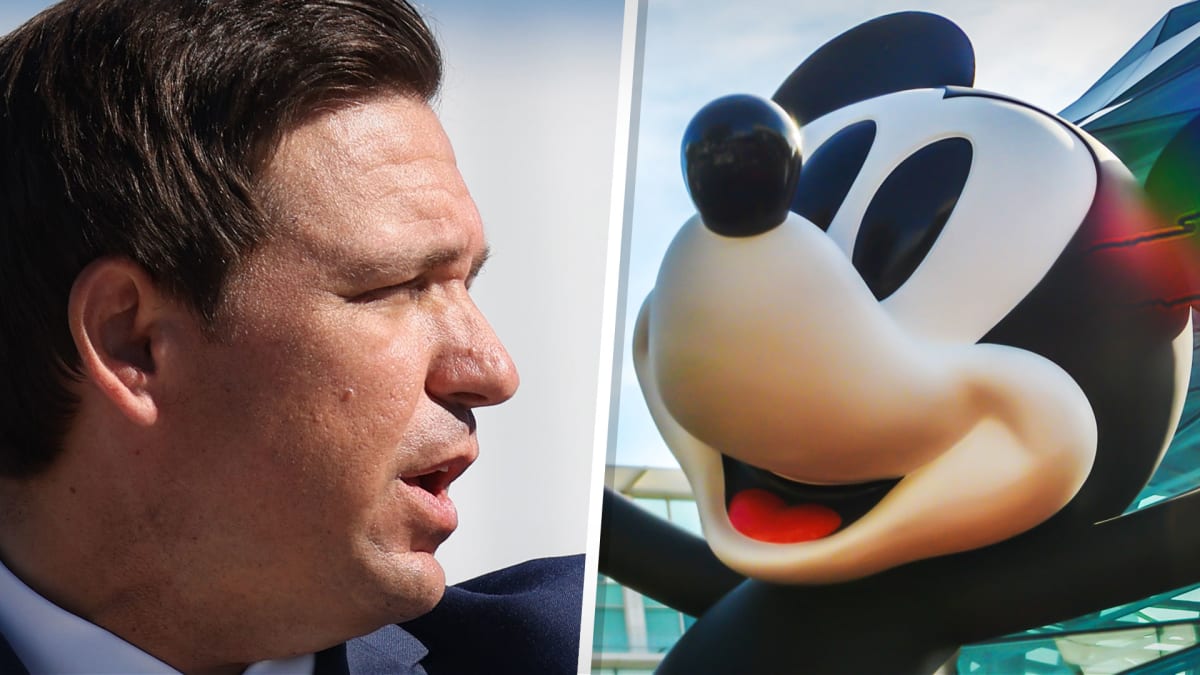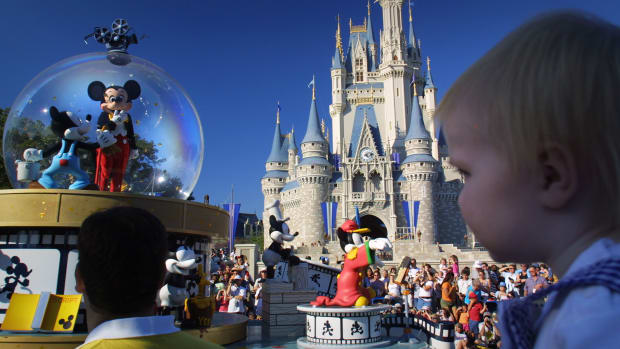
Returning Disney (DIS) CEO Bob Iger is coming back to a company that is much different than the one he left.
Forget the fact that the company's stock has fallen nearly 40% from the time when he officially stepped down at the beginning of the year
The company's most recent quarterly flop may have been the straw that broke the back of former CEO Bob Chapek's short reign.
During his time on top, Chapek was praised by some for stepping into the political arena and criticizing Florida's Parental Rights in Education law, which is derided by critics as the "don't say gay" bill.
But Florida Governor Ron DeSantis' opportunistic response to the attack on legislation he championed has soured the company's relationship with the state.

Joe Raedle/Getty Images
DeSantis vs. Disney: Round 2
Republican Florida lawmaker Randy Fine drafted a bill in April that would strip away the special self-governing agreement tDisney has enjoyed at its 25,000-acre (40 sq. mile) Reed Creek property outside of Orlando
Reedy Creek is the governing jurisdiction for the land on which Disney World sits. The district has a special taxing code and acts with the same authority and responsibility as a country government in Florida.
As TheStreet's Managing Editor Dan Kline pointed out when the law passed in April, the company would actually save millions a year if the measure goes into effect as Disney's debt obligations would pass to the state, likely leading to higher taxes to cover the payments.
The bill doesn't go into effect until next summer, however, and now, Fine has offered an olive branch, or perhaps a fig leaf to DeSantis.
Chapek's departure, and the return of Bob Iger has the state legislature reconsidering its stance, according to Fine, who said, "It's easier to shift policy when you don't have to defend the old policy. Chapek screwed up, but Bob Iger doesn't have to own that screw-up."
Those comments came after Iger seemed to signal that the company was ready to step back out of politics.
"I was sorry to see us dragged into that battle, and I have no idea exactly what its ramifications are," Iger told employees during a company town hall.
"Do I like the company being embroiled in controversy? Of course not. It can be distracting, and it can have a negative impact on the company. And to the extent that I can work to kind of quiet things down, I’m going to do that.”
The back-and-forth lead to media speculation that the state, which sees enormous financial benefits from having millions of people visit Disney World every year, and Disney were ready to patch up their 50-year relationship.
But comments from a DeSantis spokesperson over the weekend could seemingly throw cold water on any potential reconciliation between the state and Disney.
"Governor Desantis does not make 'U-turns.' The governor was right to champion removing the extraordinary benefit given to one company through the Reedy Creek improvement district."
DeSantis scored big political points -- and donations -- with his base by attacking the company ahead of his reelection as governor last month. And since he's highly likely to run for president in 2024, there's no incentive to stop until he absolutely has to.
But his spokesperson acknowledged the debt problem as well. "Disney’s debts will not fall on the taxpayers of Florida. A plan is in the works and will be released soon,” DeSantis' spokesperson said.
What's at Stake for Disney
Disney's parks, experiences and products segment saw its operating income double year over year to $1.5 billion.
For a company that just missed bottom line expectations, keeping profitable segments strong will be critical for Iger.
"We are also making meaningful progress on the return of international visitors to our domestic parks, particularly at Walt Disney World where the mix of international attendance in the fourth quarter was roughly in line with pre-pandemic levels," CFO Christine McCarthy said.
That international mix helped spending per capita rise 6% year-over-year.
Hurricane Ian, which devastated Florida when it hit in late September, cost the segment $65 million in the most recent quarter. However, Disney's domestic parks saw "significant" revenue growth year-over-year as the country moves further away from the worst of the Covid pandemic.







